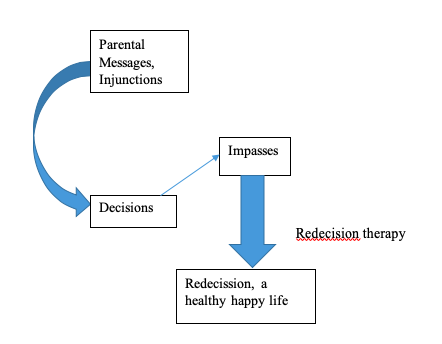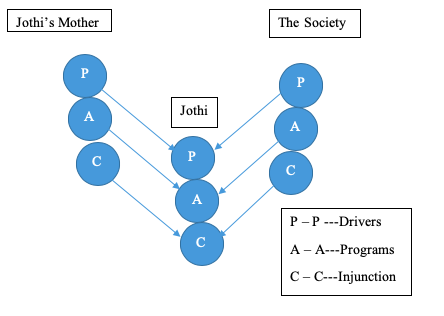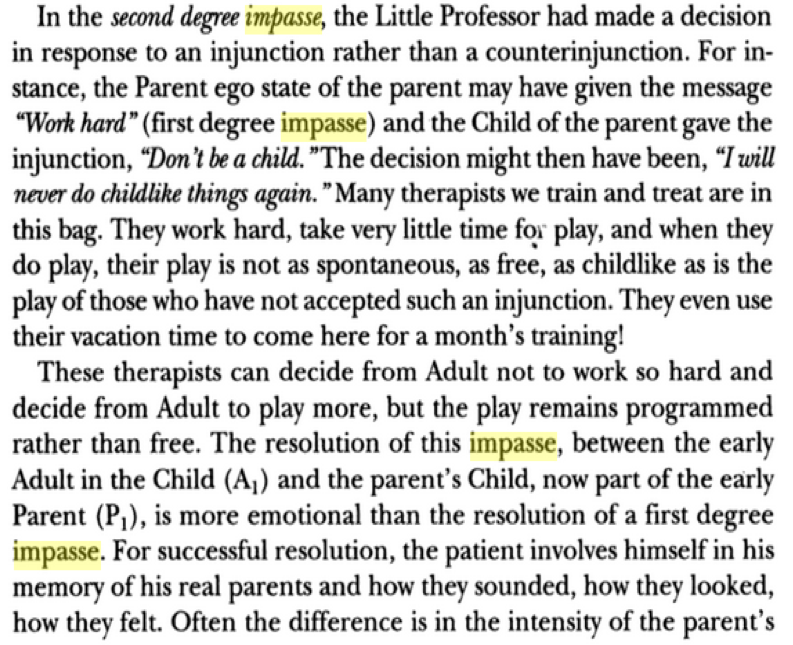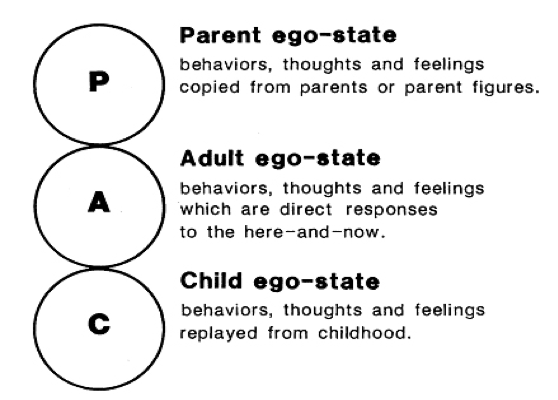Redecision Therapy Assignment Requirements
The Redecision Therapy School of transactional analysis owes its name to the work of Robert and Mary Goulding who won the Eric Berne Scientific Award in 1975. In “Injunctions, Decisions and Re-Decisions” (1976) they describe how they discovered that people are not so much “scripted” by Injunctions as that when they hear Injunctions in early life, they make a decision about the injunctions and so about their script. Because they themselves make the decision to obey an injunction, they can in their grown-up existence break through their impasses and make a choice for health and happiness. (Summerton, 1988)
Please present a case study and describe how you as a Redecision therapist would help your client break through their impasse and make an empowered choice for growth, health and happiness. Please provide insights into your client’s early beliefs and early decisions. You could use a extraction from your counselling session where your client is in symbolic dialogue with his/her mother/father.
Discuss your client’s impasse(s) and how you would resolve them as a Redecision Therapist. Please indicate specifically in your essay your client’s CONTRACT & IMPASSE(S). The case study should be integrated to the body of the essay and not as an appendix. Discuss the use of the two-chair technique with a small sample if transcript between client and therapist including early scene work, The transcript and diagrams could be presented as appendices.
Note
Please underline your client’s contract and his/her impass/es based on your case presentation.
Solution
Redecision Therapy
Abstract
Early decisions influence life into adulthood. People make decisions
often influenced by their childhood experiences, the decisions they made then,
and the impasses they developed from injunctions, counter-injunctions, and
inferred parental messages. Most of the early decisions influence life
negatively. The impasses make it impossible for the affected individuals to
lead healthy and happy lives. Redecision psychotherapy focuses on identifying
the impasses and helping clients achieve redecision through the application of
different techniques. This research uses the case study of Jothi, a 35-year-old
Indian lady who is unable to fall in love, shows inability to interact
effectively with men, or forge relationships that can lead to marriage. She is
single and enters into a contract seeking a redecision therapist’s assistance
to break through the impasses and live a fulfilling life. The research applies transaction
and Gestalt therapeutic techniques such as the two-chair technique to help resolve
the impasses. Moreover, it integrates credible literature from journal articles
and books into the case study analysis to attach credibility to the research. As
such, it is a reliable study that can be applied for further research in the
discussion of redecision therapy.
Introduction
Redecision psychotherapy rests on the fundamental concepts of injunctions, early and new decisions. Developed by Mary and Robert Goulding in 1979, the therapy is a form of transactional analysis that integrates the Gestalt therapy and offers a critical framework for the development of understanding on how learning in one’s childhood extends into adulthood (Goulding & Goulding, 1997). According to Corey (2012), an important concept forming the foundation of the therapeutic approach is the belief developed by the Gouldings’ that past premises significantly influence decision-making in adulthood. The Gouldings’ argued that such premises must have at one time in childhood been critical for survival but currently unimportant and able to limit the enjoyment of life or the achievement of happiness. The approach emphasizes the capacity to change early decisions and create awareness to enable clients to transform their lives for a fulfilling and healthy life. Moreover, according to Corey (2012), the redecision psychotherapy allows clients to learn and understand how the childhood decisions influence their action, interaction, and social integration. This research uses the case study of Jothi to outline how early childhood decisions may influence decision-making in adulthood and limit life. It explores the concepts of redecision therapy to identify the different techniques that will help resolve Jothi’s impasses.
Redecision Therapy – The Case of Jothi
Injunctions at early childhood play a critical role in the development of an impasse during a person’s childhood and spanning into adulthood. According to Corey (2012), an injunction is a parental message that influences children behavior by telling them what to do and to be to live a better life, receive recognition and acceptance from themselves. They (injunctions) can be given either directly in a verbal manner by the parents or inferred. For instance, inferred messages, according to the Gouldings’ may be such inferences such as don’t be separate from me, don’t want or need, don’t feel, don’t think, don’t be the sex you are or don’t be a child among others. In the case study of Jothi, the injunctions passed from the parents led to the development of an impasse that lowered her self-esteem and her sociability, making it difficult for her to interact effectively with others or forge relationships with people of the male gender.
Jothi’s parents passed messages to her verbally or through inferences. For instance, her mother constantly reminded her that men were evil and incapable of loving genuinely and that getting into a relationship would only lead to dire and adverse consequences for herself and the family. She often reminded her that family prestige was critical for a happy family and that she should never do anything to disgrace her family. Disgrace, according to her parents, would mainly come from a relationship with men. They constantly told her not to talk to any man and that falling in love was a sinful act that would inherently hurt her and her family. Such injunctions played a critical role in the development of an impasse that denied her the chance to enjoy life and live a happy fulfilling life with the ability to fall in love and start a family without the guilt and fear of the uncertain/unknown or of disgracing her family.
As a child, Jothi decided to accept the parental messages and to live as she was expected (Goulding & Goulding, 1997). During her puberty, the fear of disgracing her family and ending up as an unsuccessful person led to the acceptance of most of the injunctions. As such, when she was told not to feel or fall in love because it was sinful, she acted on the message by developing the notion that her feelings were not as important as the family prestige (Corey, 2012). Additionally, other critical parental messages included “don’t look at men,” “don’t be pretty,” “don’t dress-up,” and “don’t talk and be close to any boy in school.” Accepting these messages led to the development of impasses of being afraid of men, incapable of falling in love, and having a low self-esteem, and the inability to interact effectively with men. In the contract, Jothi’s wanted to develop give up her childhood decisions, attain the ability to interact with and form a stable love relationship with a man who loves her, and improve her self-esteem with the guidance of a redecision therapist.
The development of these impasses stemmed from the decision made following the event where another peer fell in love and ended up ‘disgracing’ the family by eloping with an uneducated and a lower social class person. This led her to making a decision that if she fell in love, or trusted, or talked to men, or even became close and talked to boys, then she would disgrace the family. The early decisions became a basic part of Jothi’s personality, making it difficult to easily give them off even in adulthood (Goulding & Goulding, 1997). At 35, the decisions still influence her life, and has been incapable of forging any meaningful relationship with a man. Jothi is incapable of loving or even talking to men, especially on the topic of love and relationships. As she asserts, the mention of the words “I love you,” impacts on her significantly, with guilty and fear, and is enough to make her break off a relationship.
Jothi grew up making decisions in response to the injunctions. The act contributed to the development of the impasses and keeping the decisions made following the injunctions alive (Campos, 2010). While most of the decisions made at the time might have been important for a healthier relationship with her parents, they influenced her life negatively. At her adulthood, the decisions are irrelevant and inappropriate and, therefore, redecisioning is of great importance in the case (Goulding & Goulding, 1997). As a redecision therapist, there is a need to help Jothi break through her impasses and make the choice of living a healthy and a happy life. Moreover, the choice to break through the impasse must start with Jothi becoming aware of how she allows the early decisions operate in her life. She must redicide her past decisions. The application of the redecision therapy in her case will play an important role in helping her overcome the impact of her childhood decisions, of the injunctions, and the impasses (James R., 2010). The therapeutic approach as applied in the case of Jothi will start with a discussion of her impasses and advance to apply the therapy extensively while integrating different techniques.
Jothi’s Impasses
According to Mart and Robert Goulding, an impasse is a point where two or more opposing meet, making it impossible to make a decision. At the point, progress is impossible due to the disagreement between the opposing points. As Goulding and Goulding, (1997) assert, the negotiation between the two points and the inability to reach an agreement causes a deadlock, which is invariably harmful to the individual. The development of impasses in individuals stems from the early childhood decisions made from the injunctions passed to the child. As parents focus on disciplining and helping their children grow responsibly, the different rules they set and the messages they pass to their children have a detrimental impact on the children. Such parental messages or injunctions cause impasses, which influence their lives to adulthood. The resolution of impasses is critical in the application and success of the redecision therapy (Steele & Porter-Steele, 2010). The process starts with the identification of the type and impact of the impasse on the client, whether a child or an adult.
The identification of an impasse creates room for understanding the issues and guiding the client towards breaking through the impasse or redeciding. According to Lennox (1997), the process starts with the identification of the basic bad feelings, the belief systems, and the contaminated thinking that the client depicts. These processes allow the therapist to understand the issues the client faces and the possible causes. In this light, the identification of the parental messages passed to the client in childhood (the injunctions, counter-injunctions, and the attributes that contributed to the development of early childhood decisions) is another critical step. Moreover, there is a need for the therapist to outline the early decisions made by the client in order to understand and integrate effective therapeutic measures and techniques in the process. According to Goulding and Goulding, 1997), three distinct types of impasses exist and are defined by the direct and covert parental messages passed to the client as a child. The three include type one, two, and three impasses, also represented as counter-injunctions (drivers), injunctions (stoppers), and the innate qualities (attributes or longstanding life patterns) respectively.
When a person is stuck in an impasse, s/he operates or acts without awareness in obedience to the decisions made in childhood. Such individuals face a significant challenge in envisioning options and acting in accordance with the alternative options. The childhood decisions often restricts the individuals’ thinking and thus their actions depict the influence of the ineffective and inappropriate behaviors or the chronic bad feelings they developed from injunctions (Goulding & Goulding, 1997). The determination of a client’s impasses, therefore, allows the therapist to develop ideas of the different techniques applicable during the therapy. It allows for the adoption and integration of efficient strategies and techniques in the process of treatment to ascertain a successful resolution of the impasses (James R., 2010). In the case of Jothi, the identification of the impasses will create an understanding of her situations, the injunctions that led to the development of the impasses, and the efficient and productive strategies and techniques that would guarantee success in the process of resolving the impasses.
The determination of the impasse identified Jothi’s inability to love, engage in courtship with a man, and the inability to interact with men in a way that may lead to the development of a relationship as the key impasses in her life. These impasses have made it impossible for Jothi to fall in love with any man and she automatically backs off from any relationship when anyone tells her he loves her. As such, she is worried of remaining single forever. Jothi depicts first degree or type one impasse, which she developed in response to her mother’s overt parental messages. Additionally, she reveals second degree (see Appendix C) or type two impasse developed in response to injunctions such as don’t love, don’t be pretty, don’t talk to men, and don’t disgrace our family among others (Goulding & Goulding, 1997). The main decisions made in this degree of impasse may include I will never love, I will not talk to men, I will not strive to be pretty, and I will never disgrace the family by falling in love. Handling these impasses in the therapy will enable Jothi break through them and live a happy, healthy, and fulfilling life.
Resolving Jothi’s Impasses
The application of the redecision therapy and other techniques will serve a significant role in helping Jothi break through her impasses. The redecision therapy will integrate the transactional therapy, the gestalt therapy, and the two-chair techniques to lead the client towards breaking through her impasses. To start with, the process will require guiding Jothi through awareness of the impact and influence of the injunctions and impasses on her life. The impasses developed from years of conditioning and, therefore, an intellectual decision to break through them is not enough (Goulding & Goulding, 1997). The application of experiential techniques, as Gestalt proposed, is critical for reliving early childhood scenes in which the decisions. The experiential techniques will allow Jothi to become emotionally and cognitively aware of the influence of the past decisions thus facilitating the process of redecision. As such, awareness is the initial step that as the therapist I will apply in order to help Jothi redecide and break through the impasses. It will play a significant role in helping the client shape her thinking, feelings, and behavior (Steele & Porter-Steele, 2010).
After the awareness creation, the client will be guided through the exploration of the internalized thoughts that came from the overt and covert parent messages. (Davis, Edwards, & Watson, 2015) The exploration of the dos and don’ts, shoulds and shouldn’ts around which her life and decisions surround will be important in the process. Regardless of the past decisions, the client will be advised to focus on changing and making new decisions in the present. Through the two-chair technique, Jothi will be guided in a process of returning to the childhood scenes and relive the conversations with her mother, which made her make the self-limiting decisions. As the therapist, guiding her through questions that focus on enhancing her recollection and the ability to hear, feel, experience, and describe the events and scenes will be of great importance to the redecision (Holzinger, Klösch, & Saletu, 2015). For instance, questions such as “what are you feeling as you revisit the scene? Do you picture yourself speaking to your mother? What is her facial expression? And, how is the experience like” among others will be used to help the client revisit the scene effectively and develop the ability to break through the impasses (Corey, 2012).
Moreover, from the scenes, Jothi will be allowed to re-experience the scene to develop a corrective emotional experience that will enhance the process of breaking through the impasses. The therapy will allow Jothi examine the decisions she made in childhood for the determination of whether the decisions are still helpful in her adulthood. The process, which will occur while the client is still re-experiencing the past scenes (Crose, 1990). The creation of fantasy scenes will help Jothi in the development of the ability to safely give up unhealthy and currently inappropriate early childhood decisions. Moreover, the therapy will lead the client into understanding that the decision may have been the best at the time but now serves no significant importance and needs to be given up. As the redecision therapist, it will be important to guide the client towards the modification of the decisions and the adoption of new decisions that will allow her to live a happy and healthy life (Kellogg, 2004).
For instance, Jothi will be guided through a childhood scene where she will re-enact a scene with her mother through the application of the two-chair Gestalt technique (See Appendix B and E). The re-enactment will allow her create images, relive the memories, and develop the understanding of the inefficiency of the decisions in the present as compared to her childhood (Corey, 2012). The scene will involve her mother passing the different injunctions and parental messages that made her make the childhood decisions that led to the development of the impasses. It will allow her to respond to her mother and reveal her emotions, feelings, and thoughts. For instance, while her mother tells her that all men are evil and that falling in love can only breed disgrace, Jothi will question the fact that she will be required to marry a man, may be of her parents’ choice. Additionally, she will question the fact that her mother is in love with her father and together they had a family without disgracing their parents (see Appendix E). Through the questions, Jothi will stand a chance to redecide and break through the impasses caused by the injunctions of her parents.
Conclusion
The redecision therapy
serves a critical role in helping people break through impasses created by
injunctions, counter-injunctions or attributes passed by family members and
other people held in the society. The counter-injunctions, injunctions, and
life longstanding patterns push people to develop certain decisions in their
childhood to counter, cope, or live according to the set injunctions,
regulations, or standards. While the decisions prove important in childhood,
they become inappropriate in adulthood. As such, while they may have served an
important role in childhood, they influence life in adulthood negatively,
mostly denying the person the chance to enjoy and experience happiness. Jothi’s
case reveals the impact of early decisions in an individual’s adulthood. She
cannot forge relationships with men, is incapable of loving, and “I love you” makes
her back off from the relationship. These impasses developed from her mother’s
message that men are evil, and love brings disgrace to a family. Moreover, her
mother told her not to love or talk to boys or interact with them among other
overt injunctions. The application of the redecision therapy reveals
effectiveness in handling her case and leading her to break through the
impasses. The therapy demands the integration of its core tenets such as the
Gestalt therapeutic techniques and transactional techniques such as the
two-chair technique among others. These techniques will lead Jothi towards the
realization that the early decisions are inappropriate and irrelevant and
assist her to break through the impasses to live a happy life.
References
Campos, L. P. (2010). Redecision Therapy and Social Justice. Transactional Analysis Journal, 40 (2), 85-94.
Corey, G. (2012). The art of integrative counseling. London: Cengage Learning.
Crose, R. (1990). Reviewing the Past in the Here and Now: Using Gestalt Therapy Techniques with Life Review. Journal of Mental Health Counseling, 12 (3), 279-87.
Davis, P. S., Edwards, K. J., & Watson, T. S. (2015). Using Process-Experiential/Emotion-Focused Therapy Techniques for Identity Integration and Resolution of Grief among Third Culture Kids. Journal of Humanistic Counseling, 54 (3), 170-186. doi:10.1002/johc.12010
Goulding, M. M., & Goulding, R. L. (1997). Changing lives through redecision therapy. New York: Grove Press – Distributed by Publishers Group West.
Goulding, M. M., & Goulding, R. L. (1997). Redecision therapy : a brief, action-oriented approach. (C. Lennox, Ed.) Northvale, NJ: J. Aronson.
Holzinger, B., Klösch, G., & Saletu, B. (2015). Studies with lucid dreaming as add-on therapy to Gestalt therapy. Acta Neurologica Scandinavica, 131 (6), 355-363. doi:10.1111/ane.12362
James R., A. (2010). Redecision Therapy : Underappreciated Developmental, Relational, and Neuroconstructive Processes. Transactional Analysis Journal, 40 (2), 149-158.
Kellogg, S. (2004). Dialogical Encounters: Contemporary Perspectives on ‘Chairwork’ in Psychotherapy. Psychotherapy: Theory, Research, Practice, Training, 41 (3), 310-320. doi:10.1037/0033-3204.41.3.310
Steele, C. A.,
& Porter-Steele, N. (2010). Using a Variety of Methods to Facilitate
Redecisions. Transactional Analysis Journal, 40 (2), 108-113.
Appendices
Appendix A – Racket System Diagram

Appendix B – Script Matrix

Don’t love, don’t talk to men, and don’t disgrace your family
Don’t be pretty, don’t dress-up, and men are evil.
Appendix C – the Second Degree Impasse

Appendix D

The child ego-state and the parent ego-state influenced Jothi’s behavior
significantly. However, after the therapy, the adult ego-state will have a
greater influence on her life and decisions.
Appendix E – Jothi’s Re-enactment of an early scene
Therapist: Can you please tell me one of the incidents when mother made you decide never to fall in love or be in a relationship?
Jothi: When I was thirteen, my mother, a very respectable woman in our community…
Therapist: Will you kindly re-enact the scene as if it is happening right now?
Jothi: Alright….I am coming from school with another boy, a classmate, and we meet my mother…she tells rather commands me to join her and tells my friend to run home
Therapist: will you let yourself be your mother and enact the part?
Jothi: Come hear Jothi, let’s go home…and you little boy, can you run home
Therapist: What do you feel? And what do you think your mother feels
Jothi: I am afraid, she seems angry, but I don’t know why
Therapist: will you move to that chair and be mom? What’s mom saying?
Jothi: You know, Jothi, boys are not good, you should not be walking with them or talking to them
Therapist: switch back to your chair – what do you think?
Jothi: but why mother, Alex is a nice boy
Therapist: now move to that chair and be your mother
Jothi: No! No! All men are not good, if you fall in love with any of them you will disgrace our family and yourself
Therapist: Switch back to your chair…so what do you think or feel?
Jothi: I am confused, how could all men be evil, how possible can all of them bring disgrace?
Therapist: Now move to the other chair and be mother
Jothi: All men are bad, don’t ever love, talk, walk, or even look at them…it is sinful
Therapist: How do you view love and what do you decide about your relations with men and about love
Jothi: Love is evil, it is sinful…I will never associate myself with boys or fall in love or be pretty for a man…they are all a disgrace and I will never love them
Therapist: So what do you want to change about that decision?
Jothi: I want to be friends with boys just like I am with my girlfriends. I want to interact and play with them I want to talk to them and walk with them.
Therapist: Now tell your mother what you think
Jothi: Not all boys are bad, not all are evil. And love is not a bad thing or a disgrace. After all dad is not a bad person and you love him. I also want fall in love with a man who loves one day.

